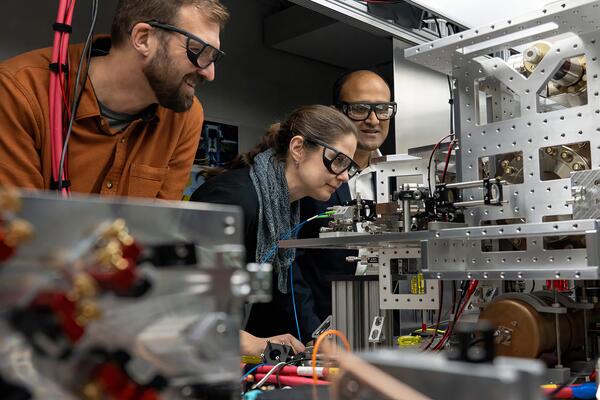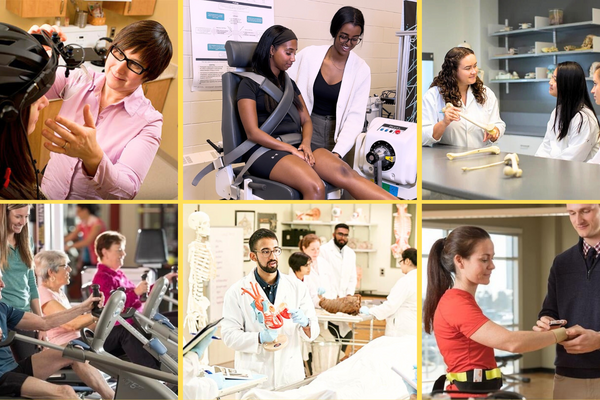
Connecting science and community
The Faculty of Science continues to inspire future scientists with its latest offering of community outreach programs

The Faculty of Science continues to inspire future scientists with its latest offering of community outreach programs
By Sarah Fullerton Faculty of ScienceA deep connection and commitment to our local region and community traces back to the University of Waterloo’s founding, and the Faculty of Science continues that tradition by inspiring and empowering the next generation of scientists through interactive and engaging outreach programming. Each year, thousands of students from the Waterloo region and beyond learn the importance of science, and the critical discoveries being made by Waterloo researchers to foster a better future for people and the planet.
With a wide range of community outreach programs, we’re excited to share the programs available for the 2024-25 school year! Discover what’s returning, explore new opportunities, and see how you can get involved with Science at Waterloo.
Lab Days
More than 3,900 students attend Lab Days, an annual outreach program designed to give Grade 11 and 12 students an inside look at life as a Science student at the University of Waterloo. From hands-on experiences in chemistry, biology, physics, and earth and environmental sciences labs to walking in the shoes of a university student during a tour of our science buildings, educators can tailor activities to match student interests and provide them with a memorable introduction to Science at Waterloo. Submit a request form to sign up

The Astro-Bubble
Step inside and explore the universe with the Astro-bubble - a portable, inflatable planetarium available for school visits and community events. Last year, more than 4,000 guests to learned about planets, galaxies, and black holes.
To book your visit to the Astro-bubble, email wca.outreach@uwaterloo.ca.
Let’s Talk Science
Every year, we visit more than 60 schools and engage with more than 6,000 students through Let’s Talk Science in-class workshops. This program allows our undergraduate students to step into elementary and high school classrooms as teachers for the day, delivering engaging, hands-on science activities at no cost.
To register your class for a visit, fill out the elementary or high school Let’s Talk Science workshop request forms.

Earth Sciences Museum programs
The Earth Sciences Museum offers free field trips or in-class visits for student groups from kindergarten to high school. Younger students can explore exciting topics like dinosaurs, rocks and minerals, while older students dive into critical issues such as the impact of microplastics on the environment. Each program aligns with the Ontario curriculum and creates an immersive and engaging learning experience with hands-on activities.
Submit a request form for your group to book a program through the Earth Sciences Museum.
Astronomy Talks at Kitchener Public Library
Each month, the Waterloo Centre for Astrophysics brings the latest in astronomical research to the Kitchener Public Library, showcasing groundbreaking discoveries made by University of Waterloo astronomers.

Annual Community Events
On October 26, join us for kid-approved science experiments at the Kids Science Open House, and don't miss the chance to visit the Gem and Mineral Show at the Earth Sciences Museum on October 25 and October 26 while you're there.
Additionally, Female and non-binary students in grades seven and eight are invited to campus on November 23 for PhysiX Girls Matter — a free day of hands-on activities featuring volcanoes, pirates, mystery goo, and exoplanets. Join the community outreach mailing list to receive registration details as they become available!
The fun continues with Family Day on February 17, when you can return to campus for a day filled with exciting activities at the Earth Sciences Museum.
Looking for more ways to get involved? Discover five ways Waterloo inspires the next generation.

Read more
Waterloo Pharmacy alum spearheads outpatient oncology clinic for patients undergoing cancer treatment at WRHN

Read more
And a new model for how quantum research is shared — opening doors for the next generation of scientists and entrepreneurs

Read more
From optometry and pharmacy to public health and therapeutics, Waterloo alumni are powering Canada’s health care sector
The University of Waterloo acknowledges that much of our work takes place on the traditional territory of the Neutral, Anishinaabeg, and Haudenosaunee peoples. Our main campus is situated on the Haldimand Tract, the land granted to the Six Nations that includes six miles on each side of the Grand River. Our active work toward reconciliation takes place across our campuses through research, learning, teaching, and community building, and is co-ordinated within the Office of Indigenous Relations.